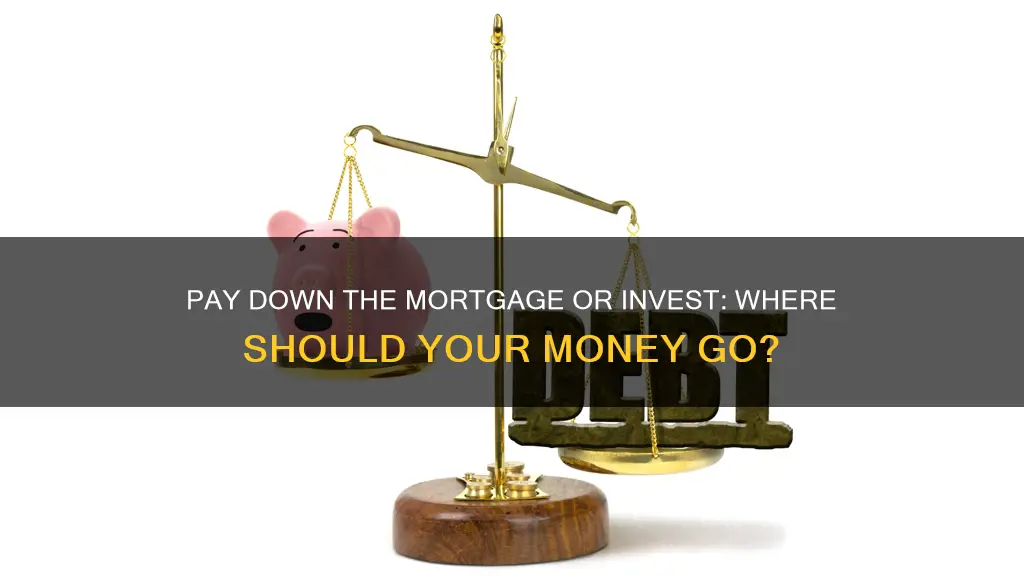
Paying off your mortgage or investing your money elsewhere is a common dilemma for homeowners. The answer depends on your financial situation, risk tolerance, and how close you are to retirement.
Paying off your mortgage early can save you thousands of dollars in interest and give you peace of mind. On the other hand, investing can provide higher returns, but it comes with higher risk and volatility.
- Interest rates: Compare your mortgage interest rate to expected investment returns. If your mortgage rate is lower than the expected returns, investing may be more beneficial.
- Risk tolerance: Investing in the stock market is generally riskier than paying off your mortgage, but it offers the potential for higher rewards. Consider your comfort level with risk.
- Retirement goals: If you are nearing retirement, paying off your mortgage can reduce your monthly expenses and provide more financial security. However, if you are still early in your career, investing for the long term may be a better option.
- Emergency savings: Ensure you have sufficient emergency savings before making additional payments towards your mortgage or investing a large sum.
- Other debts: Assess your complete financial picture, including any high-interest credit card debt or loans. It may be more beneficial to pay off these debts first.
Ultimately, the decision to pay off your mortgage or invest depends on your personal financial situation and goals. Consulting a financial advisor can help you make an informed decision that aligns with your risk tolerance and retirement plans.
| Characteristics | Values |
|---|---|
| Interest savings | Paying off your mortgage early can save you thousands of dollars in interest |
| Peace of mind | Being debt-free can ease your burden and prevent the risk of losing your home |
| Build equity | Paying down your mortgage faster means building equity in your home, which can help you qualify for refinancing |
| Opportunity cost | Any extra money you spend on paying down your mortgage faster is money you can't use for other financial goals |
| Wealth is tied up | Property is an illiquid asset, meaning you can't convert it to cash quickly or easily |
| Loss of tax breaks | Paying down your mortgage instead of maxing out your tax-advantaged retirement accounts means giving up tax savings |
| Higher returns | The stock market has historically returned an average of about 10% |
| Liquid investment | Stocks, bonds and other market investments mean you can easily sell and access your money if you need to |
| Employer match | If your employer offers a match on your retirement account, that's additional free money |
| Higher risk | There is more volatility in the stock market than in the housing market |
| Increased debt | Choosing to invest your money may not be the best option if you don't like the idea of having debt |
What You'll Learn

Weigh up the pros and cons of paying off your mortgage early
There are several factors to consider when deciding whether to pay off your mortgage early or invest. These include your financial situation, risk tolerance, interest rates, and proximity to retirement. Here are some pros and cons of paying off your mortgage early to help you make an informed decision:
Pros of Paying Off Your Mortgage Early:
- Interest savings: You can save thousands of dollars in interest payments by paying off your mortgage early. This is one of the most significant benefits.
- Peace of mind: Being debt-free can ease your financial burden and provide a sense of security.
- Build equity: Paying down your mortgage faster increases the equity in your home, which can help with refinancing or accessing credit lines.
Cons of Paying Off Your Mortgage Early:
- Opportunity cost: Paying extra towards your mortgage means less money available for other financial goals, such as retirement savings or investment opportunities.
- Wealth is tied up: Property is an illiquid asset, so accessing cash quickly may require selling your home.
- Loss of tax breaks: Paying off your mortgage early may result in losing tax deductions for mortgage interest and retirement account contributions.
Ultimately, the decision to pay off your mortgage early or invest depends on your personal financial situation and risk tolerance. Consult a financial advisor to help you weigh your options and make a decision that aligns with your goals and comfort level.
VOO: Invest Now or Later?
You may want to see also

Assess the risk of investing vs paying off your mortgage
Deciding whether to invest or pay off your mortgage early depends on your financial situation, risk tolerance, and personal preference. Here are some factors to consider when assessing the risk of investing versus paying off your mortgage early:
Risk of Investing
- Higher Returns: Investing in the stock market or other financial instruments can potentially provide higher returns compared to the interest saved by paying off your mortgage early. Historically, the average annual return in the stock market has been around 10%.
- Liquidity: Investments are generally more liquid than paying off your mortgage. If you need cash quickly, you can sell your investments, whereas selling a house or accessing home equity can be a longer process.
- Employer Match: If you invest in a retirement account and your employer offers matching contributions, you can benefit from this additional money and compound earnings over time.
- Risk: Investing in the stock market or other financial instruments carries a higher risk of losing money. There is volatility and uncertainty in the stock market, and you may experience significant gains or losses.
- Debt: If you invest instead of paying off your mortgage, you will still have debt tied to your name. This may be a concern if you prefer to be debt-free.
- Payments: Investing requires you to put money into it, which can be a strain on your finances if you are also making mortgage payments.
Risk of Paying Off Your Mortgage Early
- Interest Savings: Paying off your mortgage early can result in significant interest savings over the full term of the loan. This is one of the biggest benefits of early repayment.
- Peace of Mind: Being debt-free and owning your home outright can provide a sense of financial freedom and reduce stress.
- Build Equity: Paying down your mortgage faster increases the equity in your home, which can be leveraged for refinancing, home equity loans, or other financial opportunities.
- Opportunity Cost: Paying extra towards your mortgage means that money is not being invested in other financial goals, such as retirement savings or other investments with potentially higher returns.
- Wealth Tied Up: Property is an illiquid asset, and accessing the equity in your home can be challenging and time-consuming.
- Loss of Tax Benefits: Paying off your mortgage early may result in losing tax deductions on mortgage interest payments and the benefits of tax-advantaged retirement accounts.
Ultimately, the decision to invest or pay off your mortgage early depends on your financial goals, risk tolerance, and personal preferences. Consult with a financial advisor to help you assess your specific situation and make an informed decision.
Invest Wisely: Best Bets to Sell Now
You may want to see also

Consider the opportunity cost of paying off your mortgage
The opportunity cost of paying off your mortgage early is that you miss out on investing that money elsewhere. For example, you could invest in stocks, bonds, or a small business, all of which could offer a higher rate of return than the interest saved by paying off your mortgage early.
Let's say you have a 30-year mortgage of $200,000 with a fixed rate of 4.5%. Your monthly payments would be $1,013 (not including taxes and insurance), and you'd spend a total of $164,813 in interest over the life of the loan. Now, let's assume you're able to put an extra $300 per month toward your mortgage. By doing so, you'd save $67,816 in interest and shave off 11 years and one month from your repayment period.
However, if you were to invest that extra $300 per month in an index fund that tracks the S&P 500, you could potentially earn a higher rate of return. Historically, the S&P 500 has returned an average of 10% to 11% annually since its inception in 1926. Even if we assume a more conservative average annual return of 8%, you'd end up with $160,780 after 19 years (the time it would take to pay off your mortgage early). That's more than double your potential interest savings.
Therefore, by paying off your mortgage early, you're potentially forgoing the opportunity to earn a higher rate of return on your investments. Additionally, paying off your mortgage early may result in the loss of tax deductions on mortgage interest payments and could reduce your liquidity as your money becomes tied up in an illiquid asset like your home.
However, it's important to note that investing carries a higher risk than paying off your mortgage early. The stock market is volatile, and there are no guarantees of returns. Therefore, it's crucial to consider your risk tolerance and financial goals when making this decision.
Invest in Us: The Human Advantage
You may want to see also

Evaluate the potential tax implications of both options
There are several tax implications to consider when deciding whether to pay down your mortgage or invest.
Paying down your mortgage
If you choose to pay down your mortgage early, you may lose out on tax deductions for mortgage interest payments. This write-off can increase your tax refund and lower your taxable income. However, if you opt for the standard deduction, you may no longer be able to claim this deduction. The Tax Cuts and Jobs Act (TCJA) has also limited the deductibility of state and local taxes (SALT) to $10,000, which may impact your decision.
Additionally, if you pay off your mortgage within the first few years of the loan, your lender may charge a prepayment penalty based on the outstanding principal balance.
Investing
Investing earnings are taxable, and the tax rate depends on the nature of the earnings, such as income or capital gains. Capital gains taxes apply when you sell a property or investment for a profit, and the tax rate depends on how long you held the asset. Short-term capital gains (held for one year or less) are taxed at higher ordinary income tax rates, while long-term capital gains (held for more than one year) are generally taxed at lower rates.
If you invest in a retirement account, you may benefit from an exemption from FICA taxes, which include Social Security and Medicare taxes. Additionally, some employers may match your contributions to a retirement account, further increasing your savings.
Other considerations
Your decision to pay down your mortgage or invest may also depend on your time horizon, risk tolerance, and personal preferences. If you are nearing retirement age, you may be more likely to fall within the standard deduction and benefit from paying off your mortgage early. On the other hand, if you have a long investment horizon and can tolerate higher risk, investing in the stock market or other assets may provide higher returns.
The Investment Payback: Understanding the Timeline of Returns
You may want to see also

Seek advice from a financial advisor
Deciding whether to pay down your mortgage or invest can be a difficult decision. While there is no one-size-fits-all answer, there are several factors to consider when making this choice. A financial advisor can help you assess your finances and provide guidance based on your specific circumstances. Here are some key considerations to discuss with a financial advisor:
- Risk tolerance: Paying off your mortgage is generally considered a safer option as it is a predictable expense with fixed monthly payments. On the other hand, investing in the stock market comes with higher risk and volatility but also offers the potential for higher returns. Discuss your risk tolerance and comfort level with your advisor to determine which option aligns better with your financial personality.
- Interest rates and returns: Compare your mortgage interest rate with the potential returns on investments. If your mortgage rate is relatively low and the expected investment returns are higher, investing may be more advantageous. However, if your mortgage rate is high, prioritising paying it down could save you more money in the long run.
- Retirement planning: If you are nearing retirement, paying off your mortgage may provide peace of mind and reduce your monthly expenses. However, investing in retirement accounts can also help boost your retirement savings. Discuss your retirement goals and time horizon with your advisor to determine the best approach.
- Emergency funds and other debts: Ensure you have sufficient emergency savings and consider the impact of other debts on your financial situation. A financial advisor can help you assess your overall financial picture and determine if paying down other high-interest debts should take priority.
- Tax implications: Consult a financial advisor about the tax implications of both options. Paying off your mortgage early may result in losing tax deductions on mortgage interest, while investing in certain retirement accounts may offer tax benefits.
- Emotional factors: Discuss any emotional factors influencing your decision. For example, some people may feel uncomfortable carrying debt into retirement, while others may value the sense of freedom and security that comes with owning their home outright. A financial advisor can help you balance emotional considerations with financial strategies.
Remember, a financial advisor will provide personalised advice based on your unique circumstances, including your financial goals, risk tolerance, and current market conditions. They can help you weigh the pros and cons of each option and create a plan that aligns with your priorities.
Investing in Others: A Worthy Bet
You may want to see also
Frequently asked questions
Paying off your mortgage early can save you thousands of dollars in interest and free up your funds. You will also be debt-free and have more financial flexibility.
Paying off your mortgage early means you are tying up your money in an illiquid asset. You will also lose out on tax deductions for mortgage interest.
Investing can provide higher returns than paying off your mortgage early. Investments are also more liquid, meaning you can easily sell and access your money.
Investing is riskier than paying off your mortgage as there is a potential for losses. You will also still be in debt and have to make mortgage payments.







